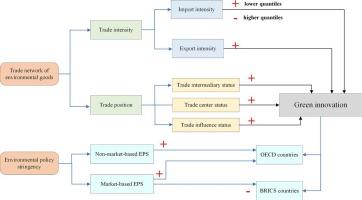Trade dynamics of environmental goods within global energy economy and their impacts on green technological innovation: A complex network analysis
IF 13.6
2区 经济学
Q1 ECONOMICS
引用次数: 0
Abstract
Trade in environmental goods, primarily renewable energy plants and wastewater management equipment, facilitates the dissemination of technologies essential for ecological preservation. Traditional indicators like trade intensity fail to capture the network advantage that a country may possess in advancing environmental-related technologies. Therefore, this study develops a directed trade network of environmental goods (EGTN) from 2002 to 2021 across 234 countries or regions. By applying network topology, we investigate the structural features and dynamic changes of the EGTN. Our analysis reveals that the EGTN has become increasingly interconnected, predominantly influenced by certain OECD countries (i.e., France, Germany and the US) and developing countries (i.e., South Africa, China, and India). Utilizing panel data from 27 OECD countries and 5 BRICS countries between 2002 and 2019, our baseline quantile regressions show that enhanced trade central status can significantly promote green innovation across all percentiles. Non-linear and U-shaped relationships are detected for betweenness centrality and closeness centrality variables. In contrast, the effects of eigenvector centrality diminish in more innovative countries. The above findings remain robust after accounting for potential endogeneity problems. Moreover, while stricter environmental policies tend to promote the development of green innovations in OECD countries, non-market-based policies in BRICS may pose challenges to advancing such innovations. Policies that facilitate information dissemination and strengthen partnerships with influential trade partners can help local organizations leverage their network advantages to spur innovation.

全球能源经济中环境产品的贸易动态及其对绿色技术创新的影响:复杂网络分析
环境产品(主要是可再生能源工厂和废水管理设备)的贸易促进了生态保护所必需的技术的传播。贸易强度等传统指标无法反映一个国家在推进环境相关技术方面可能拥有的网络优势。因此,本研究建立了一个 2002 年至 2021 年横跨 234 个国家或地区的环境产品定向贸易网络(EGTN)。通过应用网络拓扑结构,我们研究了环境产品贸易网络的结构特征和动态变化。我们的分析表明,EGTN 的相互联系日益紧密,主要受到某些经合组织国家(如法国、德国和美国)和发展中国家(如南非、中国和印度)的影响。利用 2002 年至 2019 年期间 27 个经合组织国家和 5 个金砖国家的面板数据,我们的基线量子回归结果表明,贸易中心地位的增强可显著促进所有百分位数的绿色创新。在 "间度中心性 "和 "接近中心性 "变量中发现了非线性和 U 型关系。相比之下,特征向量中心性的影响在创新程度较高的国家有所减弱。在考虑了潜在的内生性问题后,上述结论依然稳健。此外,在经合组织国家,更严格的环境政策倾向于促进绿色创新的发展,而在金砖国家,非市场型政策可能对推进此类创新构成挑战。促进信息传播和加强与有影响力的贸易伙伴的伙伴关系的政策可以帮助当地组织利用其网络优势来刺激创新。
本文章由计算机程序翻译,如有差异,请以英文原文为准。
求助全文
约1分钟内获得全文
求助全文
来源期刊

Energy Economics
ECONOMICS-
CiteScore
18.60
自引率
12.50%
发文量
524
期刊介绍:
Energy Economics is a field journal that focuses on energy economics and energy finance. It covers various themes including the exploitation, conversion, and use of energy, markets for energy commodities and derivatives, regulation and taxation, forecasting, environment and climate, international trade, development, and monetary policy. The journal welcomes contributions that utilize diverse methods such as experiments, surveys, econometrics, decomposition, simulation models, equilibrium models, optimization models, and analytical models. It publishes a combination of papers employing different methods to explore a wide range of topics. The journal's replication policy encourages the submission of replication studies, wherein researchers reproduce and extend the key results of original studies while explaining any differences. Energy Economics is indexed and abstracted in several databases including Environmental Abstracts, Fuel and Energy Abstracts, Social Sciences Citation Index, GEOBASE, Social & Behavioral Sciences, Journal of Economic Literature, INSPEC, and more.
 求助内容:
求助内容: 应助结果提醒方式:
应助结果提醒方式:


